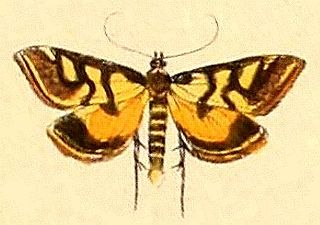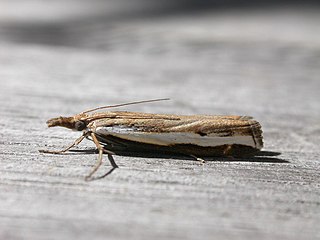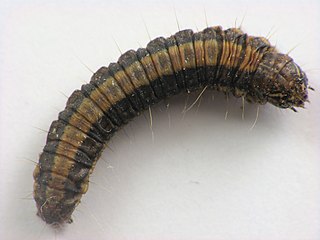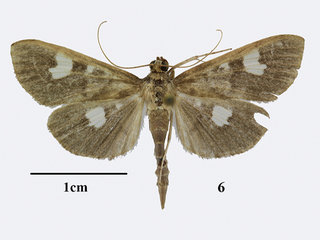
Pyraustinae is a large subfamily of the lepidopteran family Crambidae, the crambid snout moths. It currently includes about 1,280 species Most of them tropical but some found in temperate regions including both North America and Europe.

Spilomelinae is a very species-rich subfamily of the lepidopteran family Crambidae, the crambid snout moths. With 4,135 described species in 344 genera worldwide, it is the most speciose group among pyraloids.

Urodidae, whose species are commonly known as false burnet moths, is a family of moths in the lepidopteran order. It is the type genus in the superfamily, Urodoidea, with three genera, one of which, Wockia, occurs in Europe.

Crambinae is a large subfamily of the lepidopteran family Crambidae, the crambid snout moths. It currently includes over 1,800 species worldwide. The larvae are root feeders or stem borers, mostly on grasses. A few species are pests of sod grasses, maize, sugar cane, rice, and other Poaceae. The monophyly of this group is supported by the structure of the tympanal organs and the phallus attached medially to the juxta, as well as genetic analyses.

Imma is a large genus of moths in the obtectomeran "micromoth" family Immidae. This is the type genus of its family. They are widespread in the tropics, with most species occurring between the Himalayas and the Oceanian region; the genus is furthermore plentiful in the Neotropics, but not very diverse in the Afrotropics.

Eudonia is a large and widespread genus in the grass moth family (Crambidae), subfamily Scopariinae. There is no common name for the roughly 250 species placed here; new species are still being described regularly. Although the genus was proposed early in the 19th century, many of these moths were for a long time retained in Scoparia, the type genus of the subfamily and a close relative of Eudonia. A few small genera have been proposed for separation from Eudonia, but given the size of this group this is not particularly convincing; thus, all are retained here pending a comprehensive phylogenetic review.

Metallarcha is a genus of moths of the family Crambidae.

Metasia is a genus of moths of the family Crambidae. They are found mainly in Europe and Australia, but also in Africa, Asia, North America, and Pacific islands.

Notarcha is a genus of moths in the family Crambidae described by Edward Meyrick in 1884.

Orocrambus is a genus of moths of the family Crambidae. All species are endemic to New Zealand.

Platynota is a genus of moths belonging to the subfamily Tortricinae of the family Tortricidae.

Stenoptilia is a genus of moths in the family Pterophoridae.

Choreutis is a genus of moths in the family of metalmark moths (Choreutidae), and therein to subfamily Choreutinae. Of these, it is the type genus. The genus was described by Jacob Hübner in 1825.

Izatha is a genus of moths of the family Oecophoridae. They are commonly known as lichen tuft moths. This genus is endemic to New Zealand.

The Epipaschiinae are a subfamily of snout moths. More than 720 species are known today, which are found mainly in the tropics and subtropics. Some occur in temperate regions, but the subfamily is apparently completely absent from Europe, at least as native species. A few Epipaschiinae are crop pests that may occasionally become economically significant.
Musotiminae is a subfamily of the lepidopteran family Crambidae. It was described by Edward Meyrick in 1884

Gymnobathra is a genus of moths in the family Oecophoridae. It was first described by Edward Meyrick in 1883. All species are found in New Zealand.

Agroterini is a tribe of the species-rich subfamily Spilomelinae in the pyraloid moth family Crambidae. The tribe was erected by Alexandre Noël Charles Acloque in 1897.

Margaroniini is a tribe of the species-rich subfamily Spilomelinae in the pyraloid moth family Crambidae. The tribe was erected by Charles Swinhoe and Everard Charles Cotes in 1889, originally as family Margaronidae.

Nomophilini is a tribe of the species-rich subfamily Spilomelinae in the pyraloid moth family Crambidae. The tribe was erected by Vladimir Ivanovitsch Kuznetzov and Alexandr A. Stekolnikov in 1979.


















